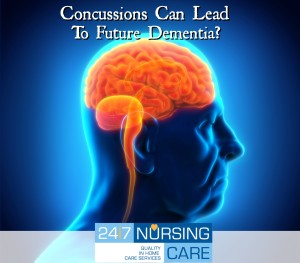Can Concussions Lead to Future Dementia?
 If you’re an avid sports player, a construction worker, or a worker in any other physically demanding position you may want to listen up. If you’ve experienced a serious head injury, this is for you as well!
If you’re an avid sports player, a construction worker, or a worker in any other physically demanding position you may want to listen up. If you’ve experienced a serious head injury, this is for you as well!
We are all aware that serious head injuries have been known to cause a variety of mental lapses including temporary and permanent amnesia, but what about dementia? Previous studies have linked severe traumatic brain injury (or TBI) with possible risk of dementia. However, we are also finding that mild to moderate TBI may increase the risk as well.
The Center for Disease Control (CDC) ranks concussions as a form of traumatic brain injury. During a concussion the brain makes contact with the skull. The event generally results in changes in the mechanics of the brain depending upon severity. PLOS One, a well-known scientific journal, has published a study that suggests varying degrees of concussion can cause or lead to dementia in the future. Researchers found that 90,000 individuals who suffered mild TBI were at higher risk for developing the brain disease. This finding was observed even after adjusting for other probable risk factors.
Findings in Other Dementia Studies
Due to some research being controversial, a multitude of other studies have been performed in order to connect the effect of head trauma to the onset of dementia. Dr. Raquel Gardner from the University of California, San Francisco, put together a test set of patients ages 55 and older. Dr. Gardner noted that compared with those who had not suffered any trauma to the head there was around a 2.4 percent difference to those with a TBI. Though this may seem relatively insignificant, the progression of the disease on those patients who had suffered a brain injury was a mere 3 years.
Even though the initial subset seemingly had a low impact rate (as far as the connection between head trauma and dementia), Dr. Gardner found 26 percent of those individuals who are older and not healthiest are definitely at risk for dementia if they previously suffered a TBI. She is convinced the effects of trauma become worse with age. Dr. Gardner concluded her study by expressing that decisively, severe TBI held risk for individuals of all ages while mild TBI had greater effect when older.
Common Ways Concussions Occur for the Elderly
Most elderly individuals experience concussions due to slip and fall accidents. It’s important to note that repeated offenses can put them at greater risk. Other ways the head can suffer injury is whiplash and not paying attention, when standing or walking, and colliding with objects. Check out our blog on slip and falls to educate yourself on prevention. Our elder care and in-home nursing services are great for helping to monitor you or your loved ones should they be at risk of injury. If you’re in Miami, feel free to contact us for a free in-home consultation.
Resources:
Dementia Risk After Brain Injury. (n.d.). Retrieved August 25, 2016, from http://archneur.jamanetwork.com/article.aspx?articleid=1919070
Does that Bump on the Head Make a Difference Later in Life? (n.d.). Retrieved August 25, 2016, from https://www.verywell.com/preventing-alzheimers-can-concussions-cause-dementia-98438
Study: Concussions Lead to Increased Dementia Risk in Older Adults. (n.d.). Retrieved August 25, 2016, from http://www.healthline.com/health-news/concussions-increase-dementia-risk-in-older-adults-102914



